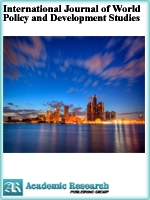International Journal of World Policy and Development Studies
Online ISSN: 2415-2331
Print ISSN: 2415-5241
Print ISSN: 2415-5241
Quarterly Published (4 Issues Per Year)

Archives
Volume 4 Number 6 August 2018
Bank Development and Human Development in WAEMU Countries: Evidence from Panel Data Estimation
Authors: S?raphin Prao YAO
Pages: 50-59
Abstract
This study empirically investigates the impact of human development on bank development in WAEMU countries. Over the period 1990 to 2014, empirical results have shown a positive relationship between banking development and human development. Credit to the private sector and the size of the economic system have a positive and significant impact on human development, but this impact remains small. Moreover, the growth rate of GDP per capita and the level of inflation have a positive impact on human development.
Women’s Membership in Agricultural Cooperatives in Gog District, Gambella, Ethiopia
Authors: Ochan Dorgi (MA) ; Amanga Okello
Pages: 43-49
Abstract
Women in Ethiopia are disadvantageous in all aspects of life despite the efforts made by government. Gender-based inequalities constrain women’s leadership ability to participate in agricultural cooperatives. To study the status of women, this research designed with the objectives to assess the current status of women membership in specific agricultural cooperatives. To address the objective of the study, quantitative method was used. Quantitative data collected from primary sources through questionnaires. Gog was selected purposively due to inadequate studies conducted on women’s status in the agricultural cooperatives. To select the sample size, 12 cooperatives with both men and women members were selected purposively and 127 respondents were selected by using simple random sampling techniques based on the probability proportionate to size. To analyze the data, simple descriptive statistical tools such as frequency, percentage, mean and standard deviation were used. Concerning the status of women members in agricultural cooperatives established in Gog district, the results show up and down in their growth for the last twelve years. Women represent only 21.3% in both management and control committees of all agricultural cooperatives which is below the number stated in article 34(7) of cooperative societies’ proclamation no.985/2016. Except for the year 2009, 2013 and 2017, the numbers of women joined agricultural cooperatives every year since 2006 were less than ten. Women represent 31.7%, 16.7% and 25% in the management committees, control committees and chairpersons respectively. The women elected as chairpersons were from cooperative whose members were only women. Therefore, over findings of the study can be concluded that the status of women is very less compared to men in all agricultural cooperatives organized in the district.



